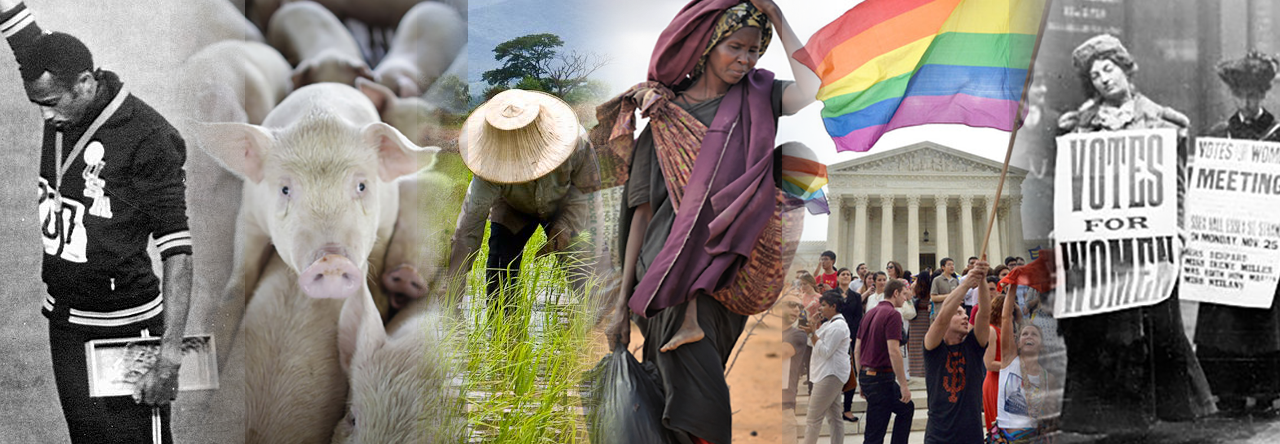A recent study indicates that reducing the consumption of meat would help considerably to slow down climate change. It may even be one of the most efficient ways to do so, since livestock emissions are making up 14.5 percent of all human causedgreenhouse gas production – which is a little more than that of all cars, trains and planes combined. In addition animal suffering and the adverse effects of excessive meat consumption on human health present two strong reasons why industrial meat production should be severely regulated. Introducing a “sin tax” on meat therefore seems to make a lot of sense from an ethical point of view and also from the perspective of (health) economics. After all, we put so-called “sin taxes” on other behaviours that we consider bad for people or the environment like smoking or fuel. If taxing meat can be supported by even more compelling reasons (after all, neither oil nor tobacco suffer in the production of the desired goods), governments seem to be obliged to engage in it. Surprisingly, however, there has been little discussion so far in politics or the media about it.
One of the main concerns seems to be that taxing meat seems to hit those the hardest that fight with bringing food on the table on a daily basis, namely people with low income. Every excise tax is discriminating towards the poor, since it raises the prices on goods without regard to income. In the case of taxing food I think that most people will react extra sensitive: eating is one of the most basic human needs while smoking or driving a car is (often) not. It seems therefore quite harsh to tax something that most people consider as basic. Especially in countries with a meat based diet (e.g. Germany or the US) people might find that one of their basic sources of nutrition is being taken away. But apart from the strong sentiments, it may be unjust to tax food in general, since poor people will be left with even fewer choices than they have now. This is a serious concern, since many poor families are already in need of food stamps or other subsidies by the government.
Still, I think that analogous arguments from the discussion of taxing fuel or smoking hold. Just as you do not have to smoke and you do not have to drive everywhere (at least if there is public transport available), you do not have to eat meat in those large amounts in which we consume it in the first world. In Western countries, where there are still plenty of choices what groceries to buy and consume, there are many alternatives to the daily dose of ham or sausage. Taxing meat also does not need to make it totally unaffordable. After all, taxes do not need to be sky-high: a moderate rise in the prices of meat may lead to the desired result that people curb their consumption and keep it on a moderate level. In addition, gains from the taxes may be used to promote the production of meat alternatives (e.g. vegetarian spread or sausages, which are still remarkably expensive in most supermarkets) and in subsidizing farmers and companies that provide good conditions for their animals. Thus, animal suffering may also be relieved, which is no small reason. As long as we are talking about a moderate increase in pricing (maybe) together with an investment in supporting meat alternatives I think that taxing meat seems just enough given the benefits.
Another argument may be raised against “sin taxes” in general. A true libertarian might object that the main purpose of taxes is to finance government not to control or even punish people who pay them. However, we may ask what it is we are paying for exactly. If all we want is some sort of Nozickean minimal state the objection is quite valid indeed. But if we also want that the state takes care of our environment and the needs of our descendants, we may also want to finance this enterprise. In the case of climate change I think that the costs and the needs of those who are and will be affected are the decisive reasons, not considerations of paternalist control. States may have to save money in order to deal with the effects of climate change in the future, e.g. with the effects of floods or blizzards. They also need the money to invest in techniques to combat climate change, e.g. alternative energies. Hence, meat taxes would serve a classic purpose.
Of course, one may wonder whether taxing meat is feasible in practice. We may think of the effects of other sin taxes, e.g. people buying cheap cigarettes duty-free or on the black market, or people driving to other countries only to buy fuel). A black market for meat or cheap imports surely does not seem to be desirable considering the pain that may be inflicted on animals. Also, what should be avoided for the same reason is the meat industry trying to counter the effects of the tax by making their production more effective and cheap. Here, only better standards and harder regulation will probably be the best route (and will naturally make meat more expensive). Hence, much more effort is involved in dealing with the problem of our considerable meat consumption than a simple sin tax. Still, I think a moderate meat tax is a good place to start.



